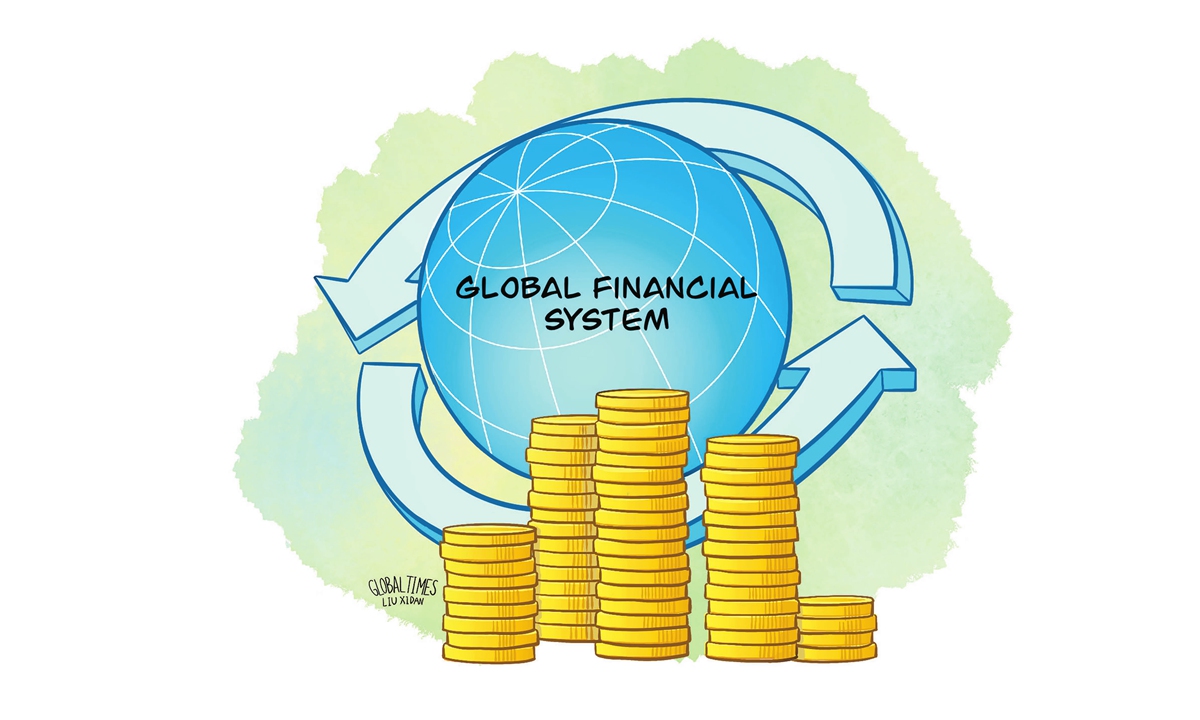
Illustration: Liu Xidan/GT
As the global financial market prepares for what has been dubbed "super central bank week," starting on March 17, the central banks of several nations, including the US and Japan, are poised to announce interest rate decisions. These decisions, while reflecting the central banks' assessments of both domestic and international economic conditions, will also affect the international financial markets, thus attracting widespread attention from global investors.
This super central bank week unfolds at a critical moment when the global economy grapples with multifaceted challenges, especially amid the looming specter of increased economic uncertainty. The volatility triggered by US trade policies is amplifying market uncertainty, presenting a palpable risk to the economic landscape. A February article in the New York Times reported that by initiating a process to impose reciprocal tariffs on American trading partners, the White House is sowing uncertainty and risking inflation.
The US tariff policy has introduced additional complexity into the nation's monetary policy framework, potentially complicating the Federal Reserve's decisions on interest rates. On the one hand, the inflationary pressures that tariffs might induce could prompt the Fed to moderate its pace of rate cuts. On the other hand, the threat of an economic slowdown may necessitate more rapid rate reductions to stimulate economic growth.
This scenario highlights the inherent tension between tariff strategy and monetary policy, emphasizing the challenges the Fed confronts within an unpredictable economic climate. Against this backdrop, the central bank's objective of sustaining economic growth while managing inflation expectations becomes increasingly daunting, especially amid the uncertainties posed by current trade policies.
Reuters reported on Friday that US consumer sentiment plunged to a nearly two-and-a-half-year low in March and inflation expectations soared amid worries that US tariffs would boost prices and undercut the economy. Some economists believe that the US economy is facing increasing "fears"of a slowdown.
Market observers widely anticipate that the Fed will adopt a cautious approach, maintaining the policy rate within its current range of 4.25-4.50 percent during its March 18-19 meeting. Simultaneously, analysts are keenly watching this meeting for any indications of policy directions. Specifically, there is heightened interest in whether the Fed might shift its focus from curbing inflation to addressing risks of an economic downturn. If such a pivot occurs, it could potentially heighten market pessimism regarding the US economic outlook.
The ripple effects of US tariffs are expected to pose challenges for central banks outside the US. In Japan, for instance, the economy grew 2.2 percent on an annualized basis in the fourth quarter, a slower pace than initially reported, complicating the central bank's case for a near-term interest rate hike, as reported by CNBC on March 10.
Beyond domestic factors, the situation is exacerbated by the findings of a Reuters survey conducted in February, which revealed that almost nine out of 10 Japanese companies expected US policies to negatively affect business. This sentiment could add further complexity to Japan's interest rate projections, highlighting the broad implications of US trade policies on the global economic framework.
The US tariff policy, while negatively affecting its own economy, also presents challenges to other markets and central banks. These challenges are anticipated to become increasingly apparent during the super central bank week, further highlighting the adverse effects of US tariff policy on the global financial markets.
Amid escalating uncertainties in the global economy, a shared challenge for central banks worldwide is to enhance the stability of their domestic finances while fostering economic growth. This underscores the critical need for increased financial collaboration among nations.
Pan Gongsheng, governor of the People's Bank of China, said on March 6 that the current external environment has become increasingly complex and severe. China will rigorously guard against external risks, maintaining the country's financial stability and safeguarding national financial security, according to the Shanghai Securities News.
The Chinese financial system is operating with overall stability. The country is intensifying efforts to keep the yuan exchange rate basically stable at a reasonable and balanced level. In the face of rising global economic uncertainties, China is continuously advancing the high-quality development of its financial sector, making a positive contribution to stabilizing the global economy.
The author is a reporter with the Global Times. bizopinion@globaltimes.com.cn




